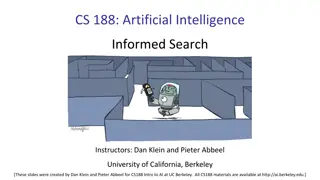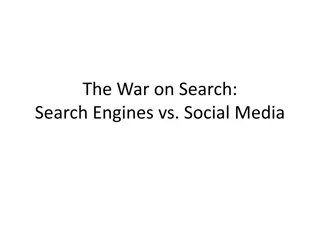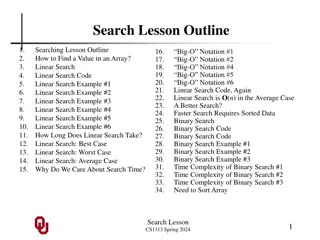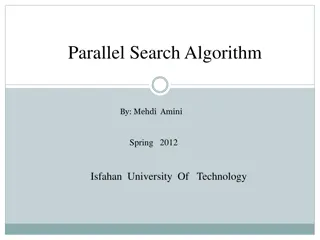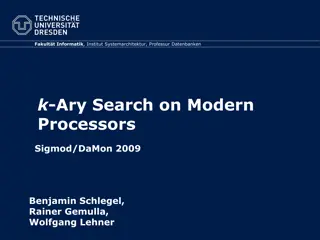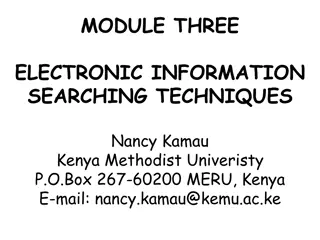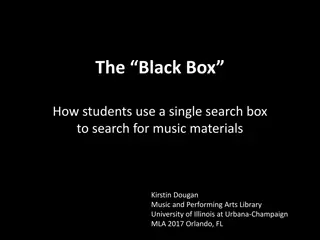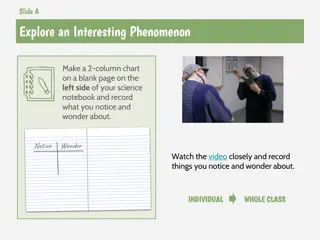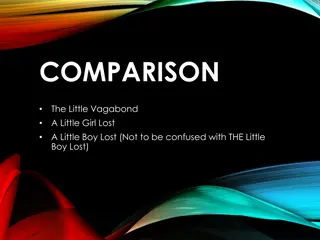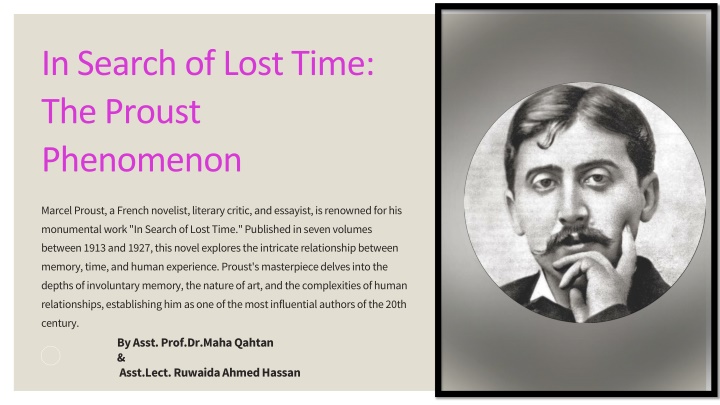
Proust Phenomenon: Exploring Memory, Reality, and Social Illusions
Delve into Marcel Proust's monumental work "In Search of Lost Time", where he explores the profound concepts of involuntary memory, the role of memory in experiencing reality, and the illusion of social status. Discover how sensory experiences trigger vivid recollections, offering pure connections to the past, gaining insights into human existence, and unveiling the emptiness of social prestige pursuits.
Download Presentation

Please find below an Image/Link to download the presentation.
The content on the website is provided AS IS for your information and personal use only. It may not be sold, licensed, or shared on other websites without obtaining consent from the author. If you encounter any issues during the download, it is possible that the publisher has removed the file from their server.
You are allowed to download the files provided on this website for personal or commercial use, subject to the condition that they are used lawfully. All files are the property of their respective owners.
The content on the website is provided AS IS for your information and personal use only. It may not be sold, licensed, or shared on other websites without obtaining consent from the author.
E N D
Presentation Transcript
In Search of Lost Time: The Proust Phenomenon Marcel Proust, a French novelist, literary critic, and essayist, is renowned for his monumental work "In Search of Lost Time." Published in seven volumes between 1913 and 1927, this novel explores the intricate relationship between memory, time, and human experience. Proust's masterpiece delves into the depths of involuntary memory, the nature of art, and the complexities of human relationships, establishing him as one of the most influential authors of the 20th century. By Asst. Prof.Dr.Maha Qahtan & Asst.Lect. Ruwaida Ahmed Hassan
The Power of Involuntary Memory Proust's novel introduces the concept of involuntary memory, exemplified by the famous "madeleine episode." This phenomenon occurs when a sensory experience in the present triggers a vivid recollection of the past. Proust argues that these spontaneous memories provide a purer, more authentic connection to our past experiences than voluntary attempts to recall them. The involuntary memory allows us to relive moments free from the distractions and concerns that may have clouded our initial experiences. This concept has become so influential that "Proust's madeleine" is now shorthand for powerful, sensory-induced memories. Present Moment 1 A sensory experience, such as tasting a madeleine soaked in tea, occurs in the present. Trigger 2 The sensory input acts as a catalyst, activating long-dormant memories. Involuntary Recall 3 Vivid memories flood back, allowing a pure re-experience of past moments.
The Role of Memory in Experiencing Reality For Proust, memory plays a crucial role in our experience of reality. He emphasizes the importance of involuntary memory, moments when present experiences trigger long-buried recollections. These instances allow us to revisit past experiences as impartial spectators, free from the delusions and distractions that may have colored our initial perceptions. Proust sees these moments of involuntary memory as opportunities for profound insight and connection with our true selves. They offer a way to appreciate the recurring patterns of human existence and to find meaning in the seemingly mundane aspects of life. Present Trigger Involuntary Recall Pure Experience Insight A current sensory experience activates a memory. A long-buried memory surfaces spontaneously. The past is revisited without present-day distractions. New understanding of self and human existence is gained.
The Illusion of Social Status In "In Search of Lost Time," Proust meticulously deconstructs the allure of high society. The protagonist's initial fascination with socialites, artists, and the elite gradually gives way to disillusionment. As he gains access to these coveted circles, he discovers that the wit, knowledge, and artistic taste he once admired from afar are often superficial and conventional. This exploration serves to demonstrate that social status, a universal human aspiration, is ultimately an empty pursuit. Proust suggests that true fulfillment cannot be found in the acquisition of social prestige. Initial Awe Access Gained The protagonist is captivated by the names and reputations of high society figures. He learns to navigate salons and hold conversations with the elite. Disillusionment Realization Upon closer interaction, the protagonist finds the allure of status to be hollow. Social status is revealed as an unfulfilling pursuit.
Proust's Cynical View of Love Proust presents a deeply cynical perspective on romantic love in his novel. He portrays it as a combination of delusion, jealousy, and narcissism. The archetypal relationship in the book is that of Swann and Odette, which exemplifies the Proustian view of love as a source of paranoia and possessiveness rather than genuine connection. According to Proust, our perception of others is heavily influenced by our own desires and biases, making true understanding of another person impossible. This leads to relationships based on mental constructions rather than reality. Delusion Jealousy Narcissism Inability to see another person accurately, clouded by one's own projections and desires. Paranoid urge to possess and control the object of one's affection, as seen in Swann's relationship with Odette. Love as a reflection of one's own needs and fantasies rather than genuine connection with another.
The Subjective Nature of Reality Proust's philosophy bears a striking resemblance to Buddhist thought in its emphasis on the subjective nature of reality. He posits that our personalities are not fixed, but rather in constant flux, changing from moment to moment. This instability extends to our perception of others, which is colored by our own experiences and biases. Proust argues that we can never truly know another person, as our understanding of them exists only in our minds. This leads to the profound conclusion that, despite our illusions of connection, we ultimately exist alone. Flux of Personality Subjective Perception 2 1 Our identities are not stable, but constantly changing and evolving. We perceive others through the lens of our own desires, knowledge, and biases. Multiple Versions Fundamental Solitude 4 3 There are as many versions of a person as there are people to perceive them. Despite illusions of connection, we ultimately exist alone in our perceptions.
The Multidimensional Nature of Time Proust's understanding of time is complex and multifaceted. He sees each moment as more than just a point on a linear timeline. Instead, he describes an hour as "a vase full of scents and sounds and projects and climates." This metaphor emphasizes the rich, sensory nature of our experience of time. For Proust, reality is not a simple sequence of events, but a complex interweaving of immediate sensations and memories. This interconnected view of time and experience forms the core of his philosophical approach in "In Search of Lost Time," offering readers a new way to understand and appreciate the depth and complexity of human existence.







